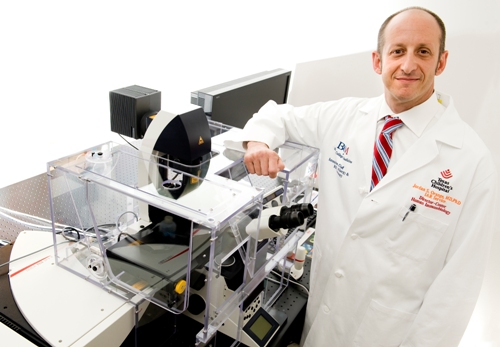Texas Children's Hospital has become the first North American institution to own a Leica microsystems gated stimulation emission depletion (G-STED) microscope, which enables scientists to capture less than 40 nm resolution images within live cells.
 Dr. Jordan Orange of Texas Children's Hospital with the newly acquired Leica Microsystems Gated Stimulation Emission Depletion microscope
Dr. Jordan Orange of Texas Children's Hospital with the newly acquired Leica Microsystems Gated Stimulation Emission Depletion microscope
Using Leica’s G-STED microscope, Texas Children's researchers will observe cellular level interactions within live cells to acquire more knowledge about congenital immune defenses and immune deficiencies to develop new therapy methods. The microscope will also be helpful in knowing the mechanisms and interplays of viruses inside a cell, providing unprecedented data about the occurrence of infections.
Jordan Orange, Director of a new Center for Human Immunobiology and Chief of Immunology, Allergy and Rheumatology at Texas Children's Hospital, and also a Professor and Section Head for Immunology, Allergy and Rheumatology at Baylor College of Medicine’s department of pediatrics, stated that this advanced microscope will provide never seen before observations on the human immune system, thus facilitating the exploration of rare immune deficiencies in kids and the development of novel therapies to treat different diseases.
Orange is studying the biology of natural immune system and innate killer cells, with a clinical focus on major immunodeficiency disease. The United States Immunodeficiency Network and the National Institute of Allergy and Infectious Diseases have provided fund for his laboratory research.
In the past 10 years, Orange has transformed the realm of human innate killer cell deficiencies in several genetic disorders. Recently, he teamed up with European scientists who achieved significant clinical advancements in utilizing gene therapy for treating young children with Wiskott-Aldrich syndrome, a rare, rigorous immunodeficiency disorder. At present, he is carrying out clinical studies to assess the efficacy of immunotherapy in improving immune function in kids with Wiskott-Aldrich syndrome. Using state-of-the-art imaging technologies, he is able to better understand these rare illnesses and human immune defenses.